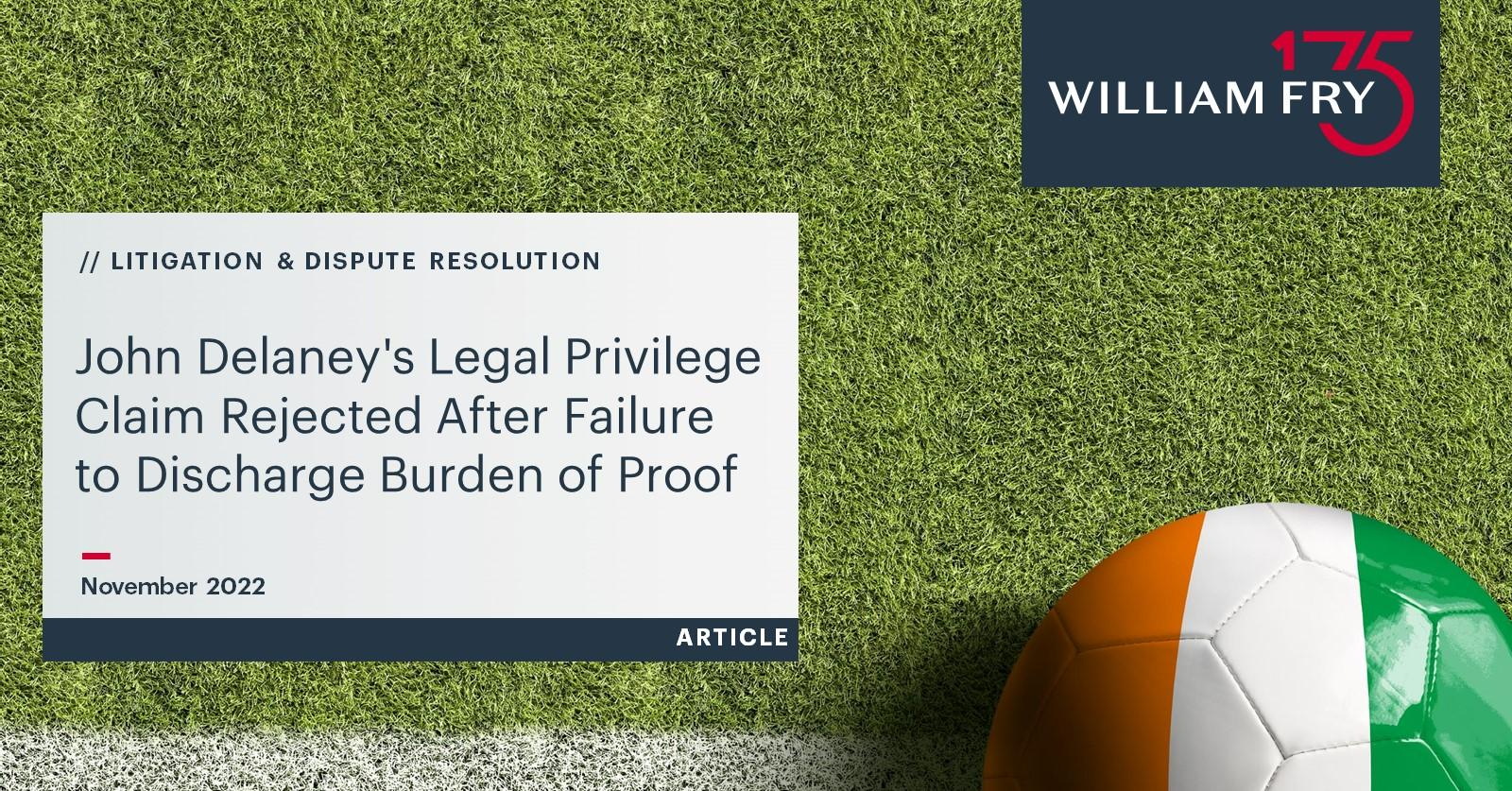John Delaney’s Legal Privilege Claim Rejected After Failure to Discharge Burden of Proof
The Director of Corporate Enforcement (Director) applied to the High Court (Court) in 2021 concerning documents that were seized from the offices of the Football Association of Ireland (FAI) on foot of a search warrant. The Director sought a determination under the Companies Act 2014 (Companies Act) as to whether certain documents attract legal professional privilege (LPP).
Section 795 of the Companies Act requires the Court to determine whether a person is entitled to refuse to produce a document on the grounds of LPP.
Two independent persons were appointed under Section 795(6) of the Companies Act to prepare a report (Report) to assist the Court in determining the LPP question. This resulted in a significant reduction in the number of documents at issue. The FAI’s former Chief Executive Officer, John Delaney, asserted LPP over these documents. LPP encompasses legal advice privilege and litigation privilege.
Legal Advice Privilege
The Court noted that legal advice privilege includes documentation prepared in contemplation of litigation and extends to any communication made for the purposes of obtaining legal advice. To successfully claim legal advice privilege:
- The communication must be between solicitor and client;
- The solicitor must be acting in a professional capacity;
- The document must be confidential; and
- The document must relate to legal advice rather than legal assistance.
Litigation Privilege
Litigation privilege allows parties to prepare for litigation without having to disclose those preparations in advance of the trial. The Court set out the criteria to be met when claiming litigation privilege as follows:
- The litigation must have been commenced or closely anticipated, and there must be a connection between the communication and the litigation itself;
- The “dominant purpose” in the preparation of the document was to assist with the litigation;
- The onus is on the party seeking to assert privilege to establish that the “dominant purpose” was that it was created in contemplation of litigation;
- The litigation must be ongoing;
- The litigation privilege must relate to the same, or closely related, proceedings.
In the present case, Mr Delaney asserted litigation privilege over most of the documents.
Common Interest Privilege
Common Interest Privilege can protect privilege where there is disclosure to a party with a common interest.
The Court outlined that a client may waive privilege, either expressly or impliedly. Unless privilege is expressly reserved, it will be taken to be waived where a privileged document is disclosed. Mr Delaney disclosed 660 of the documents in question to third parties and the onus was therefore on him to establish that they were covered by common interest privilege.
Mr Delaney’s Claim of LPP
In this case, Mr Delaney claimed privilege in respect of documents relating to proceedings involving the FAI. This directly conflicted with the FAI’s position that there was no such litigation involving it and Mr Delaney.
The Court rejected Mr Delaney’s claim that the Court was bound by the recommendations in the Report, and agreed with the Director, who relied on the decision in DPP v The Special Criminal Court [1999] 1 IR 60, to refute the argument that the Court was required to analyse each document in order to reach a determination.
The Court held that it was required to review the evidence in context of the fact that it was Mr Delaney who asserted privilege. Therefore, the onus was on him to satisfy the Court, on the balance of probabilities, that the documents in question were legally privileged.
Decision
The Court had made an Order on 22 October 2021 granting the Director additional access to 1,123 digital documents for the purpose of reviewing the documents at issue. Mr. Delaney failed to comply with this Order and failed to provide information that would assist the Director in understanding the basis for the claim of privilege being made.
The Court was satisfied that Mr Delaney had been afforded every opportunity to adequately review the documents and put forward clear evidence of privilege as required by the Court.
The Court found that the assertions of privilege were based on “vague and nebulous claims” that were “wholly unsubstantiated,” and “generalised” and further, were “devoid of any material evidence” that could assist the Director or the Court in determining the issue of privilege.
The Court also agreed with the Director that it was not required to review every document individually.
The Court rejected Mr Delaney’s claim of privilege on the basis that he had failed to discharge the necessary burden of proof required. The Court directed that the outstanding documentation be disclosed to the Director.
Conclusion
This case illustrates that the onus of proof rests firmly with the party seeking to assert privilege. A failure to provide sufficient information to the Court to maintain an assertion that documents are privileged will likely result in an order for disclosure.
Contributed by Kate Abell


